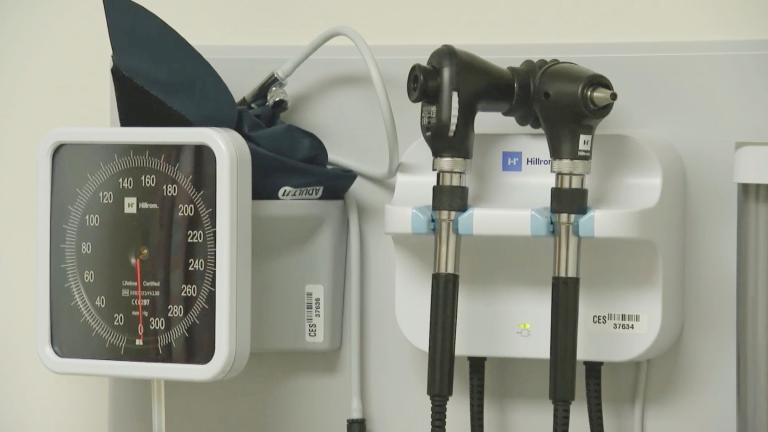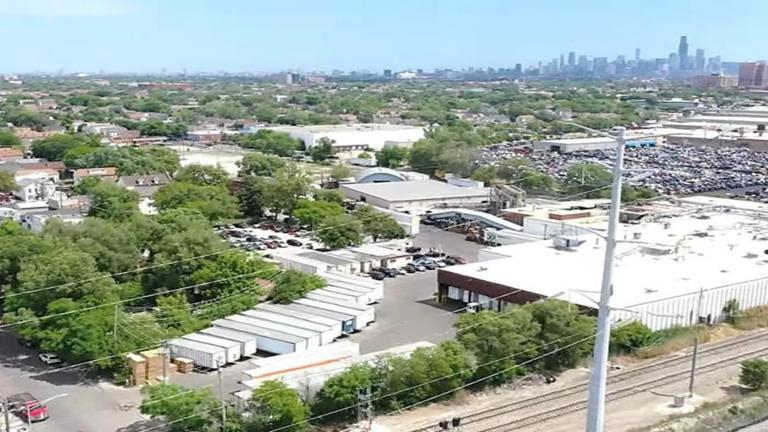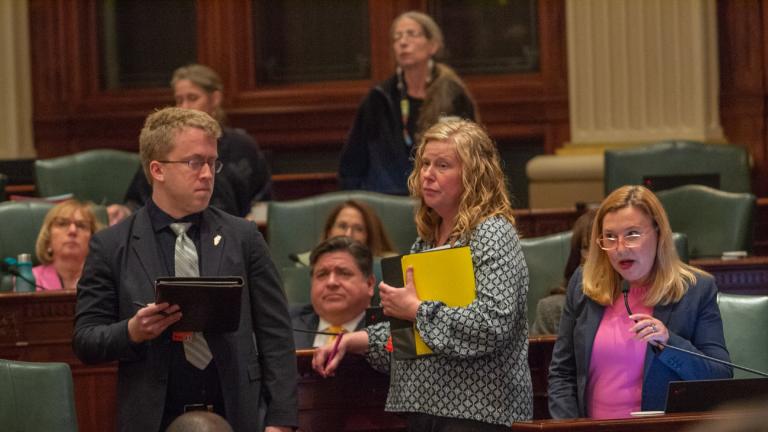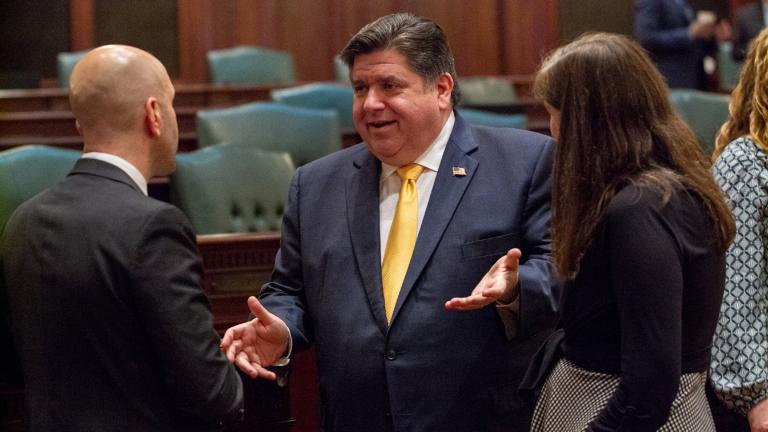Hundreds – actually 320 – of new laws took effect in Illinois when the disco ball dropped on 2023.
Among them: October will be designated Italian Heritage Month. Military veterans can get out of paying a fee to adopt an animal. And IDOT has to develop a traffic app.
WTTW News has rounded up some of the laws most likely to impact your day-to-day life.
When You’re Out and About
Don’t Light Up That E-Cig Inside: According to the Centers for Disease Control, 4.5% of Americans over the age of 18 use electronic cigarettes. But just because they don’t emit smoke, that doesn’t mean vapers can use an e-cig anywhere, anytime. “Electronic smoking devices” are now covered by the Smoke Free Illinois Act (HB1540 / Public Act 103-0272), which means vaping is banned in public places and outside public places if within 15 feet of an entrance.
Violators could have to pay a $100 fine on the first offense, and $250 for each offense thereafter. Owners of bars, restaurants, casinos, stores and other public places covered by the law are also liable — for them, it’s a $250 fine for the first violation, double that for a second violation, and $2,500 thereafter for each violation within a year of the first.
Thirst Quencher: Want to reduce reliance on plastic water bottles, but don’t like sipping from a public water fountain? That could get easier. From here on out (with SB1715 /Public Act 103-0223), if there’s a drinking fountain, there must also be a bottle filling station, so you can bring your own water bottle and fill up. The requirement only applies to new construction in public places where drinking fountains are currently mandated.
Getting Around: Cars and Commuting
Public Transit Troublemakers: CTA, Metra and other mass transit riders may want to be on their best behavior. Under a new law (HB 1342 / Public Act 103-0281), the agencies are allowed to enact ordinances and rules that could lead to suspended riding privileges and the suspension of transit cards, passes and tickets.
Youth Price Breaks: The same law will also pave the way for reduced transit costs for Chicagoans ages 14-24 who are part of city youth employment and internship programs.
Dangling Distractions: It’s still illegal to drive with something dangling from your car mirror that could get in the way of seeing what’s on the road. Or, as Illinois law says, “no person shall drive a motor vehicle with any objects placed or suspended between the driver and the front windshield which materially obstruct the driver’s view.” But with HB 2349 / Public Act 103-0032, no longer can a police officer pull over a driver solely for this reason.
Containing Camera Data: Automatic license plate readers are a tool police cite as helpful, like
when tracking down carjackers. But Illinois law now prevents footage from being used (HB 3326
/ Public Act 103-0540) against someone accessing reproductive care. For example, someone from a state where abortion is illegal who is traveling to Illinois to have an abortion cannot be tracked. Illinois also now forbids sharing automatic license plate reader data from being used to detain or investigate an immigrant without legal documentation.
EV Charging Gets a Surge: Newly constructed homes and apartment or condo complexes have to be electric vehicle ready under SB 40 / Public Act 103-0053. Builders don’t have to actually install charging stations for EVs, but construction must be done so if a resident wants to pay to install a charger, it’s possible.
There’s an App for That: There’s an phone app for just about anything and everything – including navigation systems like Waze, Google Maps (anyone remember Mapquest?) and other navigation services. But what about road construction and weather road conditions straight from the source? The Illinois Department of Transportation will get in on the app action. By law (SB 1526 / Public Act 103-0217), IDOT will have to develop a mobile app “that provides motorists with updated traffic conditions which shall include, but is not limited to, accidents, construction zones, lane closures and delays, weather conditions, and other pertinent information related to roads in this State.” There’s no deadline or indication when the app will be ready.
Tow No: Got towed? Maybe it’s the towing company that’s actually in the wrong. Per HB 3707 / Public Act 103-0199, the Illinois Commerce Commission has to publicly post when a towing company has received an administrative citation, and any related penalties.
Housing Help
Too Darn Hot: When the temp rises above 90 degrees or there’s a heat advisory, utilities by law cannot shut off gas or electric services even if a residential customer is behind on their bills (HB 1541 / Public Act 103-0019). Another law (HB 2562 / Public Act 103-0161) sets specific standards for community buildings that house residents aged 55 and older. From June through September, when outside temperatures reach 80 degrees, air conditioners must be on and working. From October through May when it’s 55 degrees below during the day, the building’s heat has to register at 68 (overnight – from 10 p.m. to 6 a.m. – the heat must register at 62).
Check Mate: A landlord cannot require a prospective renter or tenant to pay via electronic funds transfer. (HB1628 / Public Act 103-0132)
Consumer and Civil Protections
Marriage Backup: Same-sex marriage is legal nationwide, but given questions that arose after the Dobbs ruling that the U.S. Supreme Court could reverse course in the future, Illinois repealed a portion of its same-sex marriage law that voided marriages if they’re illegal in other states. With the change, even if a different state prohibits same sex marriage, a same sex couple could legally marry in Illinois. (House Bill 1591 / Public Act 103-0021).
Go Fish(ing): Illinois is trying to lure more adults back to fishing. Illinois residents age 16 years or older who haven’t purchased a fishing license in a decade can pay a lower $5 fee for one (HB 2317 / Public Act 103-0528) . Avid fishers, hunters and sportsmen can save themselves the red tape of an annual renewal, and now get three-year licenses … at three times the one-year cost (HB 3677 / Public Act 103-0456).
Deep Fake, Doxing: Victims of deep fakes (HB 2123 / Public Act 103-0294) and doxing (HB 2954 / Public Act 103-0439) can get legal relief by filing a civil lawsuit. Illinois law makes someone liable for doxing if they intentionally and without consent publish someone else’s personally identifiable information and the intent is to harm or harass the person in a way that would “reasonably likely” make them a victim of stalking, death or injury or life disruption. Likewise, to intentionally make and distribute a digital forgeries that to falsely depict someone else naked or performing a sex act could result in paying $10,000 in damages and/or a restraining order.
Fees
Domestic Violence Victims: Certified victims of domestic violence can get out of having to pay a fee to obtain vital records and documents (HB 2841 / Public Act 103-0170). Meanwhile, Illinois requires every pesticide that is distributed, delivered and sold in the state to be registered. With House Bill 3086 / Public Act 103-0441, the cost of registration is going up by $200. The product registration fee for a two-year period’s rising from $600 to $800, while the fee businesses have to pay to register for two years is rising to $1000 up from $800.
Uninsured Patients: Low-income hospital patients can rest assured they’re not left out of programs that could help pay health care bills. Under House Bill 2719 / Public Act 103-0323, hospitals must screen uninsured patients before they let loose a collection agency. The law says hospitals cannot “attempt to collect a debt from an uninsured patient” before the hospital has screened for eligibility in financial assistance programs, including government health insurance, and helping the patient to access that coverage.
Contract Protection: Ever get snookered into secretly subscribing to a magazine or other product with seemingly little room or time to get out of it? Companies have to be more upfront about their terms. A new law (Senate Bill 328 / Public Act 103-0070) says companies have to be clear with consumers on the deadline for canceling an automatic contract renewal before they’re charged, the length of the contract and any minimum purchase obligations.
Expiration Exhaustion: Food labels can get confusing. Lawmakers are trying to make them easier to understand. House Bill 3849 / Public Act 103-0208 requires that by July, the state’s agriculture and public health departments publish information that encourages food manufacturers to use uniform labeling that specifies the date a product actually expires, versus when a product should be consumed for best quality. Still, the law does not require food producers and manufacturers follow the state’s recommendations.
Education
Emergency Response: Illinois schools by law must have emergency response plans. In the wake of a shooting rampage at an elementary school in Uvalde, Texas, in which police waited to make a move, (HB3559/ Public Act 103-0194) Illinois will now require those school plans and protocols to include a way for law enforcement to quickly enter the school.
Class Requirements: Students who don’t go to school because they are taking part in a 4-H or Future Farmers of America exhibit or contest must be counted as “in attendance” under House Bill 3814 / Public Act 103-0560.
For students in the classroom, starting next school year, elementary and secondary schools will have to provide students with instruction on the dangers of allergies (House Bill 3932 / Public Act 103-0212).
High school students meanwhile must be taught in their required health class about the dangers of the opioid fentanyl (House Bill 3924 / Public Act 103-0365). A separate statue requires all schools keep an opioid antagonist on hand in a secure location. Products like naloxone can rapidly reverse an opioid overdose.
Another new law (House Bill 3203 / Public Act 103-0336) seeks to save lives from the opioid epidemic by permitting pharmacists and retailers to sell fentanyl test strips. The strips can detect fentanyl, which is more potent – and therefore more deadly – than morphine, and is sometimes mixed into drugs without a user knowing.
Higher Ed: Community college students could have an easier time transferring to a four-year intuition via House Bill 3760 / Public Act 103-0205, which starting the 2024 academic year requires public higher education institutions to implement a program on a pilot basis. The program must admit a community college student who has earned at least 36 transferable hours with a minimum 3.0 grade point average and satisfied the English language proficiency standard.
Working (And Time Off)
Minimum wage: Illinois’ minimum wage is ticking toward $15 – the goal for 2025. For 2024, the statewide minimum wage is $14, up a dollar from 2023. It’s already more in Chicago. Since July 2023, the city’s minimum wage has been $15.80 for firms with 21 or more employees (smaller businesses can pay $15 an hour).
Leave: Workers in Illinois will legally be able to take a break from work when needed, on account of various new laws.
The Paid Leave for All Workers Act is the main statute (Public Act 102-1143). Anyone who has gone back to work in the new year is already on the way to earning time off work. The act mandates that workers earn an hour of paid leave for every 40 hours worked, up to five days a year. “Workers can use paid leave for any reason and employers may not require workers to provide a basis for their time off request,” the state department of labor outlines. (Chicago in November passed its own paid leave ordinance, which provides up to 80 hours of paid time off in a year.)
Other Illinois laws give time off protections to specific populations:
- Organ donors can receive up to 10 days of paid leave in a 12-month period (House Bill 3516 / Public Act 103-0450). Employers (if they’re public or businesses with 51 workers or more) must also cover time off for blood donation.
- “Zachary’s Parent Protection Act” gives protections to those who lose a child by suicide or homicide. Companies with 250 or more workers must provide 12 weeks of unpaid leave, while smaller firms must provide six weeks of unpaid leave (Senate Bill 2034 / Public Act 103-0466).
- Within 60 days of losing a relative to “a crime of violence,” an employee can take two work weeks (or 10 days) of unpaid leave for the purposes of grieving or planning or attending a wake or funeral or otherwise making arrangements precipitated by a household member’s death due to violent crime (House Bill 2493 / Public Act 103-0314).
Follow Amanda Vinicky on Twitter: @AmandaVinicky








